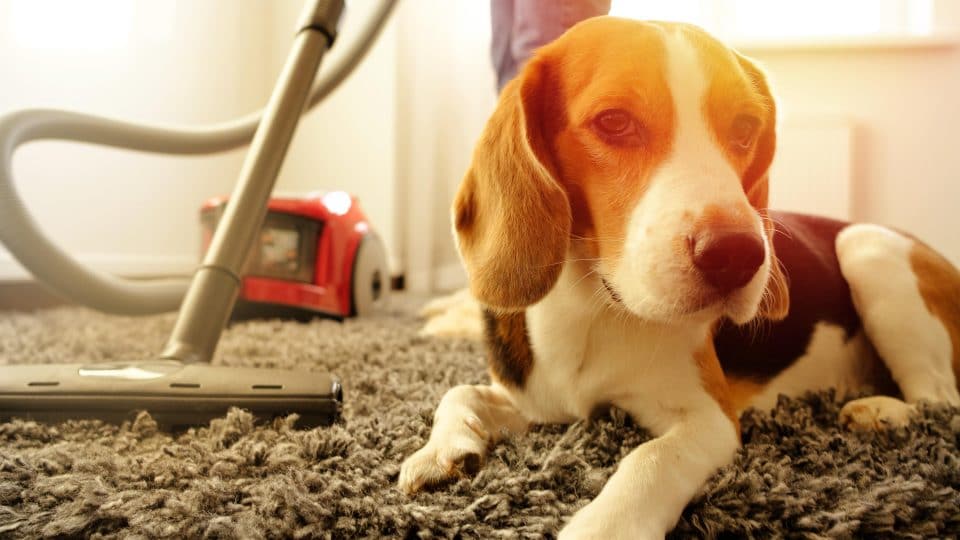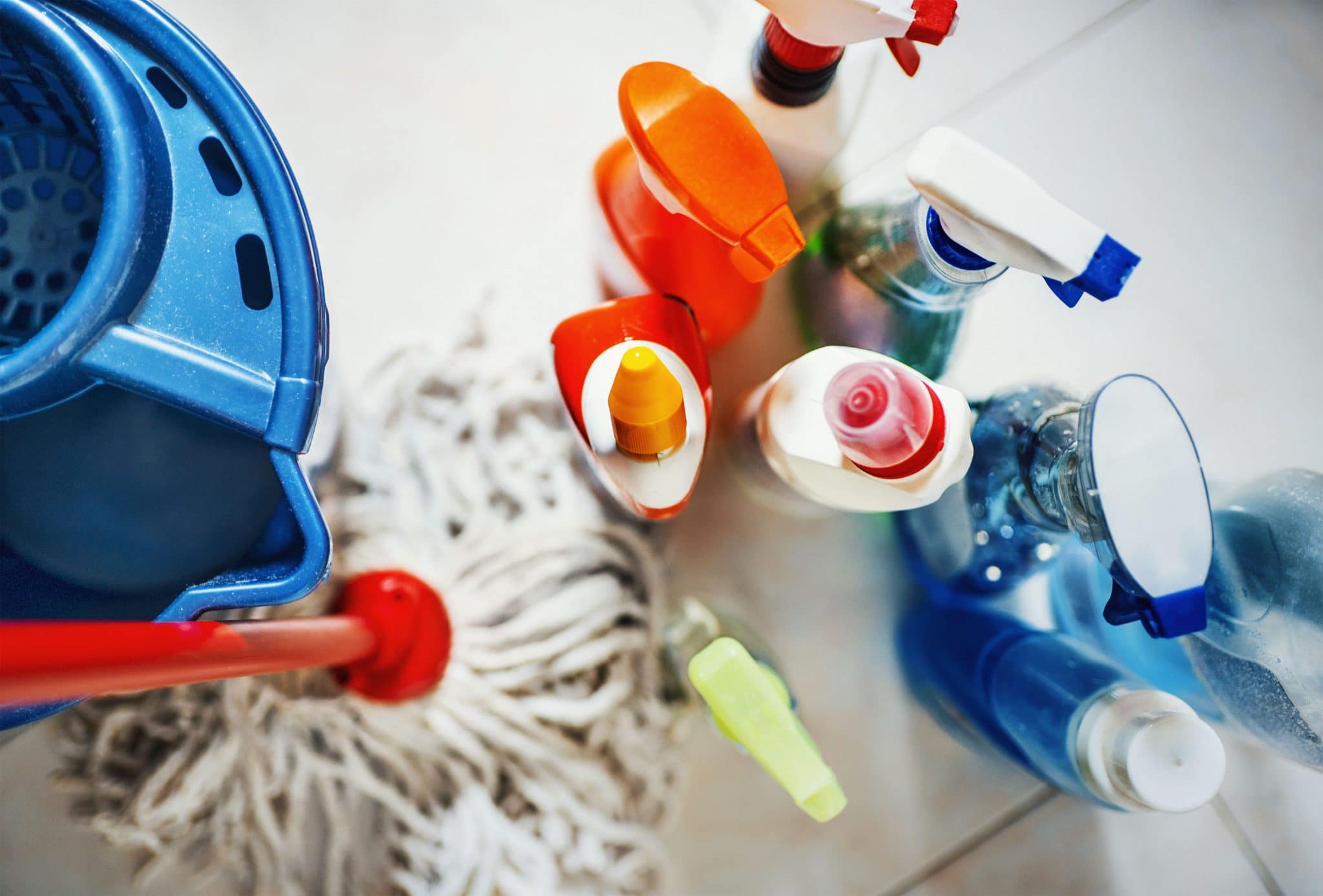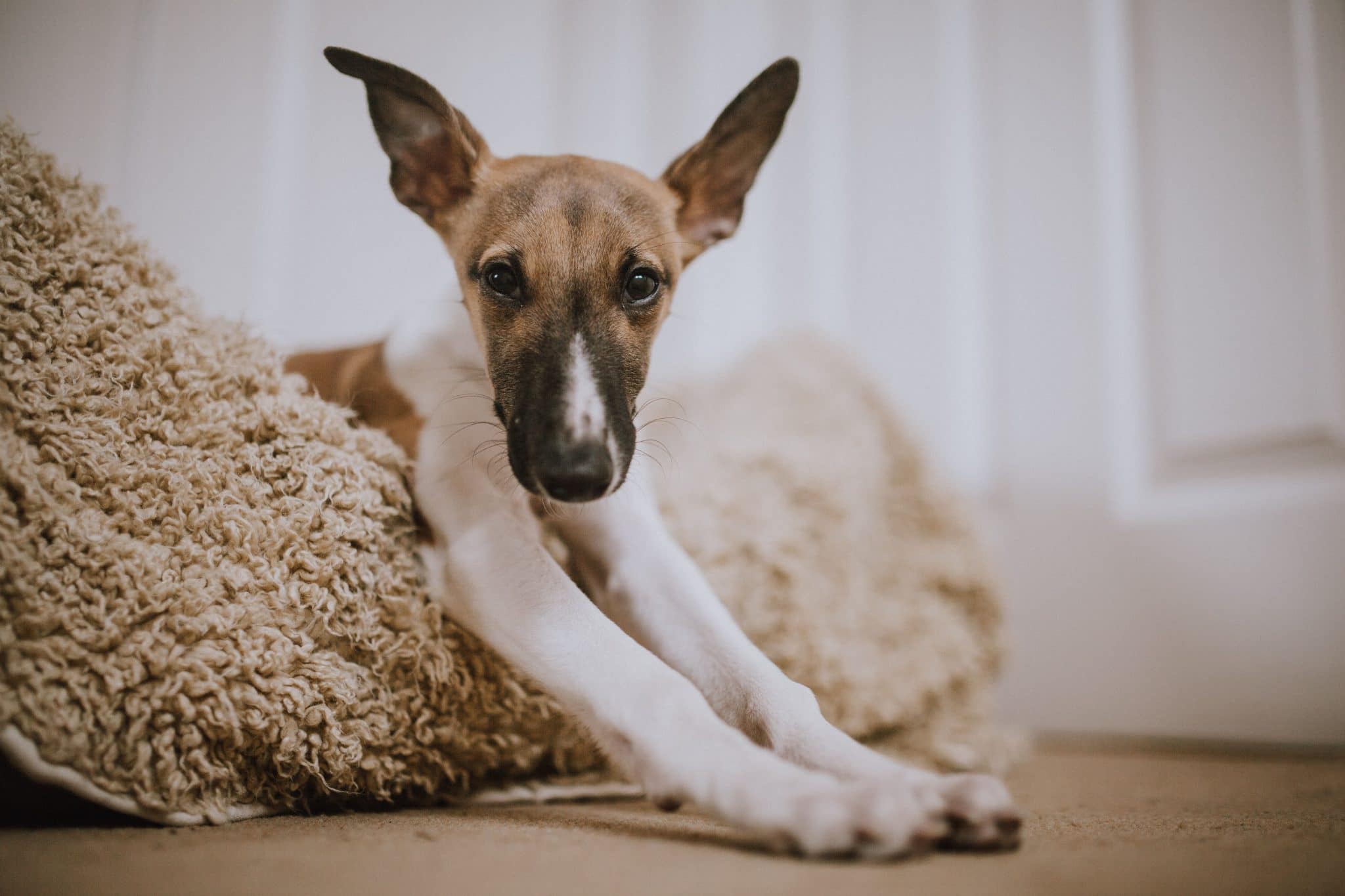If you’re thinking about giving your home a proper spring clean, it’s important to know that some of the products that we use to clean and disinfect our homes pose a significant threat to dogs (and cats).
PDSA vet, Dr. Rebecca Ashman noted:
Millions of us use bleach, oven cleaner, dishwasher tablets and laundry detergents all the time in the home but we need to realise how dangerous they can be to our pets. Products such as bleach and detergents are highly corrosive and cause permanent and even life-threatening damage to a pet’s skin or insides if swallowed.
(source)
Your dog can also suffer burns to the skin, eye damage, and breathing issues even if they don’t actually ingest any of the chemicals. In order to protect your four-legged friend from danger, owners should ensure that the products they’re cleaning with are safe to use around pets.
We decided to give you some information about how to make sure your dog is kept safe whilst you’re cleaning your home—we’ll list the toxic ingredients to look out for as well as the safer pet-friendly options available, and give you general tips on how to clean with a dog around.
How are dogs likely to be poisoned?
Just like young children, dogs don’t understand the dangers of some products. Many of the UK’s pets suffer from accidental poisonings due to cleaning products. Chemical poisoning from household cleaners most commonly occurs when dogs:
- Drink a tainted substance
- Clean a toxic substance from their fur or paws (like floor cleaners or laundry detergents)
- Drink from a toilet that contains cleaning agents
- Ingest household cleaning agents
- Eat air fresheners
What ingredients in cleaning products are not safe for dogs?
It’s important to bear in mind that dogs sometimes lick things off the floors and they use their mouths to clean themselves which increases the potential to ingest a harmful substance that comes in contact with their fur or paws. When it comes to the safety of cleaning products, the bottom line is, if the product is something you wouldn’t put in your own mouth, then you need to make sure it’s not used on a surface that your dog could potentially lick.
It’s also worth noting that even when chemical cleaners are put away and closed, the vapours left behind can continue to harm both us and our pets. As an animal’s respiratory rate is faster than a human’s they can suffer from more toxic exposure.
Chemicals that are toxic to pets
Most of us have homes with various different types of cleaning products that contain toxic chemicals. The following chemicals which are regularly found in household cleaners are harmful to pets, and especially dangerous if ingested:
- Chlorine
- Ammonia
- Isopropyl (rubbing) alcohol
- Formaldehyde
- Phenols
- Benzalkonium Chloride (BAC): toxic to cats
- Phthalates
- Perchloroethylene (PERC)
- Triclosan
- Butoxyethanol
- Sodium Hydroxide
Types of cleaning products that are most harmful to dogs:
- Bleach
- Toilet bowl cleaners
- Oven cleaners
- Laundry detergents
- Drain cleaners
- Floor cleaners
Is cleaning with bleach ever safe if you have pets?
As we’ve mentioned before products such as bleach can cause permanent and even life-threatening damage to a pet’s skin or insides if swallowed. If you do use bleach, make sure that your dog never comes into contact with it in its concentrated form (same goes for any cleaning product that needs to be diluted). You should also ensure that you use a properly diluted bleach solution if you do clean something that your pet will come into contact with, follow this up by thoroughly rinsing the area and airing out the room—if these steps are followed it is not expected to cause harm. If the bleach odour is overwhelming, open windows and use fans to air out the room.
If you’d prefer not to risk it, there are fortunately safer alternatives which we’ll get to next.
What cleaning products are safe for dogs?
If all that information has you a little worried, don’t be! It’s fairly simple to keep your home clean without using harsh chemicals. There are plenty of pet-safe, non-toxic, green cleaning products that are just as effective as chemical products, and they’re not only pet-friendly, they’re environmentally-friendly to boot.
Look for cleaning products that have the terms “non-toxic,” “plant-based,” and “natural” and be sure to read the ingredients. Enzymatic cleaners are also non-toxic and biodegradable, and they can tackle tough stains including urine, vomit, faeces, blood, grass and dirt.
Of course even the safest, most natural cleaning products carry some level of risk if they’re ingested by your pets so it’s important to always keep them securely out of your dog’s reach. Having said that, you’re much less likely to cause any serious damage to your pet’s health if you use non-toxic options.
If you’d like to know about some of the least toxic, most effective cleaners for areas of your home that most affect your pets, check out our list of cleaning products that are safe for use around dogs—these include all-purpose surface cleaners and pet stain removers.
Brands to look out for include, Tincture—which produces organic, eco-friendly, chemical-free cleaning products made with essential oils and botanical extracts that are safe to use around babies and pets—and Puracy, which offers natural, organic, non-toxic, plant-based, hypoallergenic home essentials that are safe for the entire family, including furry members.
There are also lots of natural cleaning products you can use to break down grease and grime which won’t harm your pets, or be as damaging to the environment, these include:
- Baking soda
- Vinegar
- Lemon juice
What about cleaning your dog’s bed and toys?
Laundry detergent residue left behind on clothes, pet blankets, and cuddly toys can be harmful to your pet, especially those that chew on their bedding and toys. There are many non-toxic detergents available; Seventh Generation is a trusted brand in the “green” cleaning space, and their laundry detergent is free of potentially harmful chemicals and additives.
The coating on fabric softener sheets which aren’t pet-safe can cause kidney failure and pulmonary oedema when a pet chews on the sheet so make sure you use a pet-friendly option and dispose of them immediately as they can be a choking hazard.
What are the best dog-safe ways of cleaning your house?
Dogs and cats, especially young ones, are inquisitive by nature, and will want to investigate everything, including those things that could be dangerous. It is up to you as a responsible pet owner to make sure each room of your home provides a safe environment for your beloved pet. Here are some guidelines to follow when cleaning your home:
Keep your dog out of harm’s way
- If you’re cleaning floors or other areas pets use, keep them out of the room while you’re mopping floors or wiping down surfaces. If using chemicals, rinse the area with clean water afterwards. Don’t let them back into the room until everything is dry.
- Make sure when cleaning your kitchen and bathroom that the room has plenty of ventilation.
Always read the labels
- Look to labels for advice and if you have products in your house which say that they are corrosive or harmful if ingested, keep them well away from your dog.
- Follow the instructions: Disinfecting cleaning products (especially floor cleaner, bleach, Dettol, etc.) will often be designed for diluting before use. In their concentrated form, any strong type of disinfectant, bleach, etc. may be harmful if your dog comes into direct contact with it.
Carefully store cleaning products
- Some pets will naturally explore or chew boxes and containers, so it’s really important to keep cleaning products safely locked away in closed cabinets or on high shelves that your dog has no way of accessing.
- Consider installing child-proof latches on cabinets, as some pets are not only curious but quite clever.
Dispose of cleaning supplies safely
- After cleaning, dispose of unused or dirty solutions, and clean and put away cleaning implements like mops.
- Dispose of empty cleaning containers promptly and properly. Keep bins securely covered so that pets cannot get into them.
Kitchen and bathroom
- Kitchens and bathrooms might pose some of the most serious threats to pets. As we’ve mentioned, floor cleaners are one of the main culprits when it comes to accidental poisoning. Tincture’s eco-friendly floor cleaner works on wood, stone, laminate, tiles and all other types of hard flooring.
- If you have an animal that drinks from the toilet bowl, do not use a continual cleaning product and keep the lid closed at all times.
Living room and bedroom
- Carpets and furniture will retain residue that could be harmful to your dog. Puracy Carpet & Upholstery Shampoo is a great pet-safe option if you need to shampoo your furniture or carpet.
Garage
- Clean the floor of the garage to ensure that chemicals (such as antifreeze which can be fatal if ingested) are gone.
What if your dog comes into contact with any of the hazardous cleaning ingredients?
If you suspect your dog might have been exposed to toxic cleaning chemicals keep a close eye on behavioural changes and look out for the following symptoms:
- Ulcerated or irritated skin including inside the mouth
- Vomiting
- Diarrhoea
- Coughing
- Difficulty eating
- Excessive salivation or foaming at the mouth
- Pawing at the mouth
- Rashes or burns
- Lethargy or malaise
- Seizures
If you think your dog has come into contact with dangerous cleaning products, take the following steps:
- First of all stay calm.
- Remove your dog from the source of any poisonous substance and do not try to make them vomit.
- Determine what substance is responsible. Read the product’s label for the list of ingredients and for any instructions on accidental ingestion.
- Contact your vet immediately and inform them when, where and how poisoning occurred—follow your vet’s advice!
- Collect the poison and take the container (or a sample if you don’t have the packaging) with you if you are advised to take your pet to the vet practice.
Never attempt to treat dogs yourself and don’t wait to see what happens. Call your vet and ask for advice. You can also call the Animal Poison Helpline at 01202 50 9000.
Ensuring that animals get urgent veterinary treatment if they are suspected to have been in contact with household products can be the difference between life and death.
The bottom line
Opt for natural, non-toxic products wherever possible. Always read labels on products and follow their warnings about contact with animals, and keep them safely out of reach of your pets.
Here are a few more helpful resources:
- Prep a pet first-aid kit for your home to be ready for emergencies you can handle.
- If you think your dog has ingested something poisonous, call the Animal Poison Helpline
- RSPCA Poisoning in Dogs
Your adorable friend offers love and affection, and they deserve your protection so follow our guidelines for safe spring cleaning!




